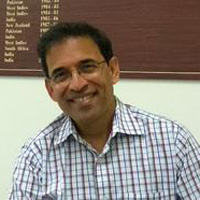Opinion India needs to address the problem of plenty: Harsha Bhogle
When he was captain of New Zealand,he said,they had to make the most of what they had
During a panel discussion to launch our book (The Winning Way),Stephen Fleming,erudite and dignified as usual,made a very interesting observation that a lot of us should be sitting up and thinking about.
When he was captain of New Zealand,he said,they had to make the most of what they had. They weren’t exactly swimming in a pool of talent and so had to work hard to achieve what they did. They were like a single income family budget or a finance minister in a scarcity driven economy. Every player counted and I sometimes wonder if that is the attitude that has made generations of New Zealand teams punch above their weight.
 As coach of the Chennai Super Kings he was working with a lot of talent and admitted that it took him time to adapt to working with plenty. Effectively,while in New Zealand he had to optimise resources here he had to ensure that ability didn’t go waste! It is a critical difference; a millionaire can be privileged and yet vulnerable because there isn’t the hunger,and therefore the satisfaction,of earning a living. It is also the reason why small town boys from less privileged families are dominating those that do not always know scarcity.
As coach of the Chennai Super Kings he was working with a lot of talent and admitted that it took him time to adapt to working with plenty. Effectively,while in New Zealand he had to optimise resources here he had to ensure that ability didn’t go waste! It is a critical difference; a millionaire can be privileged and yet vulnerable because there isn’t the hunger,and therefore the satisfaction,of earning a living. It is also the reason why small town boys from less privileged families are dominating those that do not always know scarcity.
Fleming also said that when you sometimes have a very large pool of players,you can miss talent pretty quickly; or not find an opportunity for it if it matures late. Many years ago,in a delightful tea-time conversation at the Kensington Oval,Sir Garfield Sobers had said something similar about why Barbados produced the extraordinary players it did (just try making an all-time Barbados XI as Ian Chappell and I once did during a long road journey). The reason,he said,was that they didn’t lose any players because it was such a small island whereas he thought India probably lost far too many.
So India can either decide that losing players early is like the law of the jungle where only some survive; or come up with a talent management programme that is specific to players at different stages in their development. I guess you don’t have to worry too much with players in the national team apart from managing their work load but it is those on the fringe or those that have had to be left out that you need to handle carefully.
Let’s try and illustrate with a few examples. Players like Cheteshwar Pujara,Ajinkya Rahane,Rahul Sharma and Iqbal Abdulla clearly have the ability but not the exposure to different conditions. They need to play in South Africa,in New Zealand,in England — anywhere. It’s like sending a bright young sales executive to Warangal,Hissar and Jorhat. An ‘A’ team programme is perfect for them and maybe it is time to have a parallel ‘A’ team tour structure. Indian cricket has the money to fund many development programmes and if they can unearth one gem a year,the investment will yield magnificent dividends.
Then there are others; players who have been with the Indian team,are clearly men with promise but who,due to injury or form or competition,have got a bit sidelined. They just need to play as much cricket as possible to get back into rhythm. Not for them just yet,the high pressure of an IPL or international cricket.
Maybe a little more relaxed cricket where they can learn more about themselves and their craft,in England for example. These are players like Pragyan Ojha,Irfan Pathan,Murali Vijay,Dinesh Karthik and Manoj Tiwari. If they get the opportunity to play in England,ideally four day cricket,the BCCI must give its nod by,as they used to say,return post.
The problem of having too many players. though,needs to be addressed. It is as much a matter of losing players as it is of letting them play cricket of inferior quality. Ah,you can guess where I am headed! Keep domestic cricket down to fifteen teams. If you don’t,it means administrators and the vote count for more than cricketers. If India have to stay number one,the quality of domestic cricket will be paramount. If it means having fewer teams and fewer administrators,so be it!





